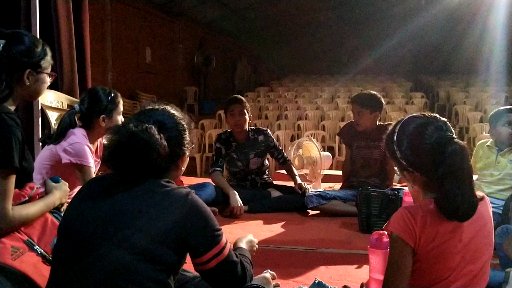The Discussion sessions
Children like to discuss. They enjoy participating in a thought process.
Discussions are essential for a common understanding of any thought.

Discussions
The `keep quiet’ culture
Many times we see children talking to each other. They talk while going to school, while coming from school, and in the recess too. Even during the lecture, they can't keep quiet. Teachers keep on saying `keep quiet,' `keep quiet.' They hardly can stay silent. It is evident that children like to talk, and they have plenty of thoughts to share.
Talk to children
But really what do they talk to each other? Are they able to speak with the same enthusiasm with parents? With teachers? With neighbors? If the answer is yes, then it is good. Do the adults have some time to talk to children?
Children are good listeners. I have experienced it in every session. What we are supposed to do is to begin the discussion at a proper time. It is the time when everyone is seated comfortably, have played enough, and are in a mood to talk.
The healthy creative noise
People like to see children sitting quiet and often ask them to concentrate on reading, writing, etc. Children do go through that task. But then afterward they want to do something noisy to come out of that silence. They approach the dearest friend for that. If two or more friends come together and start talking in a joyous mood, the surrounding people start noticing the noise. They ask them to keep quiet.
During rehearsals, such friends are twenty or more. Imagine these many children in a theatrical mood. Their voices together make quite a noisy atmosphere. They jump and run and shout and do monologues in a high volume. You have to keep yourself cool and develop a habit to tolerate that if you want to do children's theatre.
People ask me sometimes, “Doctor, don’t you get a headache with this noise?” I smile and answer them, “It’s a healthy noise, a creative noise.”
I like their liberation. It’s creative. We just have to channelize this tremendous energy with our discussion sessions.
Music: The pleasant companion
Every sensitive mind resonates to music. When these talkative children sing together in a familiar note, they create a beautiful world. Children like to sing and dance. They look good when moving along. They are so quick and flexible, their reflexes so prompt and energetic; they can give excellent performances in music and dance if the script demands it. As in any other theatre, children’s theatre also has a special place for music. Rather it is the essence which attracts many kids towards theatre. Who doesn't like to sing? Having the ability to maintain a note and throw your voice really needs proper training. Continuous rehearsals can play wonders and they build confidence to sing. Theatre training helps to develop your voice. If you know the music you are able to deliver dialogues effectively.
We have created around one hundred songs for our plays. We sing those as per our mood and get charged for the rehearsals or the discussion sessions. We have musical instruments in our rehearsal room, and anybody can use them at their will. Many children take interest and learn to play them. Many children go to music classes and train themselves. This inspiration for music helps them throughout their life. Music is a pleasant companion.
The simple start
I start it after a proper relaxation or a short recess and with some appropriate song. As the song and the music floats in the air around the noise goes away, and what remains is a curiosity about the discussion. As the song ends a silence, which we need badly to concentrate on any given subject. The discussion session then goes on for an hour at least. Every child gets enough of chance and time to express its views on the subject. We derive some important conclusions which we use in the rehearsals.
We have to start with a simple question like `so, how was this Sunday?' or `Who got the man of the match yesterday?' or` Have you seen the wax museum in Devgad?'Anything you think of their interest to start with, which will make everybody relaxed.
Focus on the subject
Then with the short introduction about the achievement so far in rehearsals, we can start the discussion on the theme or about the topic. This dialogue with them changes the mood, and everybody tries to focus on the subject.
Their suggestions are valuable. Children think about the play at home, at the school or whenever they find time to think. It can be a market or a playground. When they notice something important, they make it a point to tell it in the discussion session the next day. They wait for their turn and place their suggestion in front of all. Which may be a simple observation they did about their role or some costume or some mistake they found in the script or inappropriate behavior of a particular character.
They think about all the elements of theatre. Less the age more they think it seems. I get
suggestions and queries more from smaller children. Maybe they do not have much inhibition. Or they want to tease bigger children by showing their smartness.
( Analyzing the children’s mind is a continuous thought for the person who wants to work with children.)
Will tell you a story of a three and a half-year-old child who had played a little crow in `a landscape.’
When we told him that, he was supposed to play a little crow in the play; he started observing crows around. He could mimic the way they sit, the way they turn their neck and the types of calls they make. He did draw crows so many times and in various poses. It was as if he had that as a topic for his research. He used to talk about that in discussions. And he did that role well and was very much appreciated by the audience.
Will tell you a story of a three and a half-year-old child who had played a little crow in `a landscape.’
When we told him that, he was supposed to play a little crow in the play; he started observing crows around. He could mimic the way they sit, the way they turn their neck and the types of calls they make. He did draw crows so many times and in various poses. It was as if he had that as a topic for his research. He used to talk about that in discussions. And he did that role well and was very much appreciated by the audience.
I remember another story of him. Once I read a book about George Carver to children.
I think `the little plant doctor’ was the title of that book. A small book about the biologist was an impressive one. He suggested,” If we make a play, in one of the scenes, we can show him doing a painting. He also suggested how and where we will have his laboratory. He inquired me whether I have a cassette to give the background sound of the rain? There was a scene in which we needed to have a rainy day. This thought was terrific for me to receive it from him at that age.
Not that bigger children don’t suggest or ask; they are so much aware of the theatre; I feel they can direct a play themselves. Some children have six to seven plays to their name and can conduct rehearsals in the absence of the director.
Discuss when needed
The discussion can start in the middle of rehearsal too. It can begin at any time. The time when you think a particular point needs some collective understanding, you can stop the rehearsal and give a call to everyone for a discussion. Clearing doubts at the right time saves us from getting on the wrong track.
We were rehearsing to convert Ruskin Bond's story `Blue umbrella' into a play. The story is about forgiveness. It was difficult for children to understand this emotion. How one can reach the graceful feeling of forgiveness, mercy, was the question. We did a long discussion with examples, and it worked to get the right expressions. If you read the story, you will know the two characters, the little girl Binya, and the old shopkeeper Rambharosa. Great story to read to children.
During the rehearsals of our play `The story of mankind,' we had long discussions on what animals might be thinking about human beings. We inquired about the possibilities of the language they might be using, their emotions, their ambitions, and their future.
Since we are talking about ` a landscape' in this course throughout, I will like to give a few of the discussions we did in those rehearsals at that time.
When the father is quite irritated and angry in the first scene, it was difficult for us to move ahead with the same discussion.
Two things:
-It was spoiling the mood of the play at the very beginning of it, which I was not happy about.
-Having a lengthy discussion on the subject of the play before introducing the main characters was not suitable for the play.
We were not proceeding further and were stuck up for some time at that point. One of the senior artist, fourteen years old, suggested to me that the father will calm down on his own after looking at the landscape of his village.
We tried doing that.
Then there is a long pause, and the mood of the father changes. Everyone in the family is relieved from the tense situation after that. The audience too enjoys the scene and gets carried away with the gift of the books and the binoculars.
I remember many such contributions and remember those children too.
( Here is that part of the script)
Mother:
Did something happen in the meeting today?
Father:
Why do you think so?
Mother:
The way you are speaking.
Why are you so irritated?
Father:
(takes a deep breath and still can not control the anger.)
Some people still think that the mining industry is going to play a major role in the development of Konkan.
What madness.
Mining will kill everything.
(Father is angry. He goes inside, towards the kitchen, with a glass of water in his hand.
He puts it down with anger.
All hear the sound. All look worriedly in the direction he went, and follow his movements and stare at him together till he comes out and stands near Prachi’s painting. He controls his anger now and gets busy looking at the painting.
Looks impressed by the painting.)
Mazi Shala - Episode 38 - Srujanachya Wata - Dr.Rajendra Chavan
https://www.youtube.com/watch?v=W4YgIxuzfgI&feature=youtu.be
